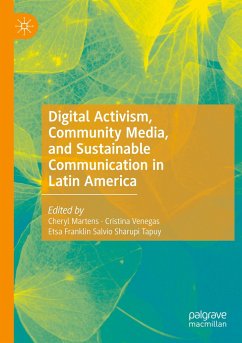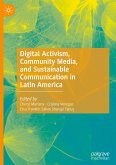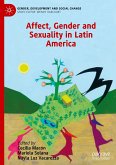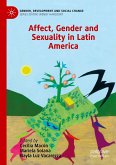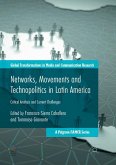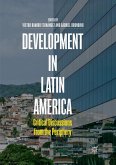Digital Activism, Community Media, and Sustainable Communication in Latin America
Herausgegeben:Martens, Cheryl; Venegas, Cristina; Franklin Salvio Sharupi Tapuy, Etsa
Digital Activism, Community Media, and Sustainable Communication in Latin America
Herausgegeben:Martens, Cheryl; Venegas, Cristina; Franklin Salvio Sharupi Tapuy, Etsa
- Broschiertes Buch
- Merkliste
- Auf die Merkliste
- Bewerten Bewerten
- Teilen
- Produkt teilen
- Produkterinnerung
- Produkterinnerung
This book brings together academic and activist work on community media, feminist, decolonial, and Indigenous perspectives to digital activism, including Free and Open Communication in Latin America. The essays in this collection speak to major changes over the past decade that are reshaping digital media uses and practices. The case studies presented here question many commonly held assumptions around global media ownership, sustainability, and access relevant to countries beyond Latin American contexts.
Andere Kunden interessierten sich auch für
![Digital Activism, Community Media, and Sustainable Communication in Latin America Digital Activism, Community Media, and Sustainable Communication in Latin America]() Digital Activism, Community Media, and Sustainable Communication in Latin America77,99 €
Digital Activism, Community Media, and Sustainable Communication in Latin America77,99 €![Affect, Gender and Sexuality in Latin America Affect, Gender and Sexuality in Latin America]() Affect, Gender and Sexuality in Latin America100,99 €
Affect, Gender and Sexuality in Latin America100,99 €![Affect, Gender and Sexuality in Latin America Affect, Gender and Sexuality in Latin America]() Affect, Gender and Sexuality in Latin America139,09 €
Affect, Gender and Sexuality in Latin America139,09 €![Networks, Movements and Technopolitics in Latin America Networks, Movements and Technopolitics in Latin America]() Networks, Movements and Technopolitics in Latin America93,99 €
Networks, Movements and Technopolitics in Latin America93,99 €![Development in Latin America Development in Latin America]() Development in Latin America77,99 €
Development in Latin America77,99 €![Towards a Comparative Analysis of Social Inequalities between Europe and Latin America Towards a Comparative Analysis of Social Inequalities between Europe and Latin America]() Towards a Comparative Analysis of Social Inequalities between Europe and Latin America39,99 €
Towards a Comparative Analysis of Social Inequalities between Europe and Latin America39,99 €![Towards a Comparative Analysis of Social Inequalities between Europe and Latin America Towards a Comparative Analysis of Social Inequalities between Europe and Latin America]() Towards a Comparative Analysis of Social Inequalities between Europe and Latin America54,99 €
Towards a Comparative Analysis of Social Inequalities between Europe and Latin America54,99 €-
-
-
This book brings together academic and activist work on community media, feminist, decolonial, and Indigenous perspectives to digital activism, including Free and Open Communication in Latin America. The essays in this collection speak to major changes over the past decade that are reshaping digital media uses and practices. The case studies presented here question many commonly held assumptions around global media ownership, sustainability, and access relevant to countries beyond Latin American contexts.
Produktdetails
- Produktdetails
- Verlag: Palgrave Macmillan / Springer International Publishing / Springer, Berlin
- Artikelnr. des Verlages: 978-3-030-45396-1
- 1st edition 2020
- Seitenzahl: 384
- Erscheinungstermin: 6. August 2021
- Englisch
- Abmessung: 210mm x 148mm x 21mm
- Gewicht: 496g
- ISBN-13: 9783030453961
- ISBN-10: 3030453960
- Artikelnr.: 62203059
- Herstellerkennzeichnung Die Herstellerinformationen sind derzeit nicht verfügbar.
- Verlag: Palgrave Macmillan / Springer International Publishing / Springer, Berlin
- Artikelnr. des Verlages: 978-3-030-45396-1
- 1st edition 2020
- Seitenzahl: 384
- Erscheinungstermin: 6. August 2021
- Englisch
- Abmessung: 210mm x 148mm x 21mm
- Gewicht: 496g
- ISBN-13: 9783030453961
- ISBN-10: 3030453960
- Artikelnr.: 62203059
- Herstellerkennzeichnung Die Herstellerinformationen sind derzeit nicht verfügbar.
Cheryl Martens PhD is Associate Professor of Sociology in the Liberal Arts program at Universidad San Francisco de Quito. Her research and publications concentrate on the sociology and political economy of communication, media policy, and digital activism in South America. Cristina Venegas PhD is Associate Professor of Film and Media Studies at the University of California, Santa Barbara. Her research focuses on the politics, histories, and formations of global and transnational media, revolutionary media cultures, media historiography, and film festivals with an emphasis on Latin America. Etsa Franklin Salvio Sharupi Tapuy is an Amazonian leader of Quijos and Shuar heritage. He is currently the Communication Advisor for the Quijos Nationality (NAOQUI), and a digital journalist (lancero digital) in CONFENIAE's Amazonian community press. As a researcher and Quijos wankiri and Shuar juakmaru (sage leader), he has been a guest lecturer at international conferences in Europe and throughout the Americas, specializing in Quijos history and the anti-colonial hero and leader, Jumandi. He is currently completing a degree in Anthropology at Universidad Politécnica Salesiana in Ecuador.
1. Transforming Digital Media and Technology in Latin America.- Part I Digital Territories: Transnational and Local Hybrid Experiences/- 2. Radio Indígena and Indigenous Mexican Farmworkers in Oxnard, California.- 3. Sounds of the Neighborhood: Innovation, Hybrid Urban Space, and Sound Trajectories.- 4. Practitioner Perspective. Digital Networks in Bolivia: Territory, Community Collaboration and the Wayna Tambo Diversity Network.- Part II Approaches to Decolonizing Knowledge and Communication.- 5. Open Knowledge, Decolonial, and Intercultural Approaches to Communication Technologies for Mobility: The Achuar Kara Solar Project.- 6. Open Access in Dispute in Latin America: Towards the construction of counter-hegemonic structures of knowledge.- 7. Narratives for the defense of the digital commons.- 8. Autonomous Infrastructures: Community Cellphone Networks in Oaxaca, Mexico.- Part III Digital Activism and Resistance.- 9. Favela Digital Activism: The Use of Social Media to Fight Oppression and Injustice in Brazil.- 10. Jiujitsu moves, radio bemba, and other transmedia practices: social movement strategies counter statist media power.- 11. Digital Activism and the Mapuche Nation in Chile.- 12. Practitioner Perspective. Feminist Cyberactivism in Theory and Practice.- Part IV Documenting, Representing, and Strengthening Indigenous Language and Culture.- 13. Re-presenting Indigenous in Ecuadorian Media: A NewsFrames Approach.- 14. Challenging Asymmetries of Power and Knowledge Through Learning Communities and Participatory Design in the Creation of Smart Grids in Wayúu Communities.- 15. Indigenous Journalism in Ecuador: An Alternative Worldview.- 16. Practitioner, Perspective. Digital Communication Strategies for Strengthening and Empowering Amazonian Peoples and Nationalities: Community Radio and the Quijos Nation.
1. Transforming Digital Media and Technology in Latin America.- Part I Digital Territories: Transnational and Local Hybrid Experiences/- 2. Radio Indígena and Indigenous Mexican Farmworkers in Oxnard, California.- 3. Sounds of the Neighborhood: Innovation, Hybrid Urban Space, and Sound Trajectories.- 4. Practitioner Perspective. Digital Networks in Bolivia: Territory, Community Collaboration and the Wayna Tambo Diversity Network.- Part II Approaches to Decolonizing Knowledge and Communication.- 5. Open Knowledge, Decolonial, and Intercultural Approaches to Communication Technologies for Mobility: The Achuar Kara Solar Project.- 6. Open Access in Dispute in Latin America: Towards the construction of counter-hegemonic structures of knowledge.- 7. Narratives for the defense of the digital commons.- 8. Autonomous Infrastructures: Community Cellphone Networks in Oaxaca, Mexico.- Part III Digital Activism and Resistance.- 9. Favela Digital Activism: The Use of Social Media to Fight Oppression and Injustice in Brazil.- 10. Jiujitsu moves, radio bemba, and other transmedia practices: social movement strategies counter statist media power.- 11. Digital Activism and the Mapuche Nation in Chile.- 12. Practitioner Perspective. Feminist Cyberactivism in Theory and Practice.- Part IV Documenting, Representing, and Strengthening Indigenous Language and Culture.- 13. Re-presenting Indigenous in Ecuadorian Media: A NewsFrames Approach.- 14. Challenging Asymmetries of Power and Knowledge Through Learning Communities and Participatory Design in the Creation of Smart Grids in Wayúu Communities.- 15. Indigenous Journalism in Ecuador: An Alternative Worldview.- 16. Practitioner, Perspective. Digital Communication Strategies for Strengthening and Empowering Amazonian Peoples and Nationalities: Community Radio and the Quijos Nation.

